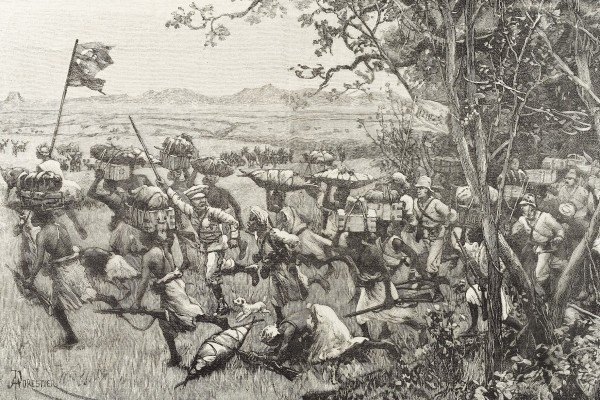Searching for the adult in the room: Canada’s recent electoral upheaval
Journalist and author Justin Ling’s latest book explores how threats from the south dramatically reshaped Canada’s 2025 election

Mark Carney on the campaign trail in advance of the 2025 federal election. Photo courtesy Mark Carney/Facebook.
The complete reversal represented by Canada’s recent federal election of April 28, 2025, left a nation shocked. Generally a politically apathetic population, Canadians were awakened from their slumber by the combative rhetoric of Donald Trump, such that the rising popularity of Conservative Party leader Pierre Poilievre, until then seemingly unassailable, rapidly dissipated in the wake of the president’s threats of annexation. Justin Ling, a freelance investigative reporter, followed the campaigns of Poilievre and Liberal Party leader Mark Carney, tracing the dramatic shift in popularity from former to the latter as the two campaigns sought to respond to the threats from the south. In his book, The 51st State Votes: Canada Versus Donald Trump, Ling reported from the two campaign trails. Newly elected as Liberal leader, Carney, Ling asserts, successfully coined a new form of Canadian nationalism, one that promised to break down interprovincial trade barriers and prioritize infrastructure development to facilitate the east-west movement of goods and labour. Defence would also become a priority. Carney would stand up to Trump and be the desperately needed “adult in the room” able to negotiate a new relationship that would be profitable for Canada, and, at the very least, maintain our sovereignty.
The development of the Canadian Pacific Railway in the late-19th century was a project as much about the colonial expansion of Canada—connecting the North-West to Ontario and Québec—as it was about national security. And it delivered. The following century saw a fairly comfortable partnership develop between Canada and the US, one that made both countries very rich. That comfort evaporated last November, however, with the election of Trump. Once again, Canada finds itself uneasily restructuring its economy on the precipice of American expansionism. Had this relationship not shifted so rapidly, every Canadian knows that our country’s recent elections would have gone in a very different direction. Ling enlightens the reader with observations from the campaign trail to show that in the wake of Canadians’ dire ambivalence with regard to our imperial neighbour to the south, the advantage shifted rapidly from Poilievre to Carney.
By April, Canada had become a notable target of American expansionism. Ling notes that just before the elections, Trump was asked directly by Time magazine if he was trying to “grow the American empire,” to which the president responded: “Wouldn’t mind.” By confirming Trump’s goal to annex Canada, along with Greenland and the Panama Canal, Carney was able to play upon the anxieties of Canadians and convince them to take their own country seriously. Trump, Carney proposed to Canadians, intended to reorder the global economy—an arrangement from which he said that we benefitted significantly—and attack our way of life. By distancing himself from Trump’s recent actions and statements, and from the US in general, Carney has been able to position himself not as a sycophantic ally but, rather, a worthy opponent.
And indeed, America’s position in the world has begun to shift. American cuts to USAID and that organization’s missions in various countries will have severe implications for global democracy, not to mention public health. Ling points out that the British medical journal The Lancet projects that over the next 15 years, the USAID cuts will lead to 15 million additional deaths from AIDS, two million additional deaths from tuberculosis, eight million additional child deaths, and more than 10 million deaths due to unsafe abortions.
Canada has always been a bit lazy on the global stage. Ling notes that we have been happy to allow the Americans and Europeans to do the heaviest lifting: America would handle the “tricky geopolitical files” while “Europe could be counted on to pursue moral and humanitarian causes.” Canada simply showed up to agree with our Western counterparts and pitch in whatever money we needed to. But geopolitical roles are changing now that Trump’s America is dropping out. Unable or unwilling to read the room, Poilievre came across as a geopolitical isolationist, making comments similar to Trump’s regarding tariffs and cuts to foreign aid. In an interview with Radio-Canada, Poilievre promised that under his leadership, Canada would cancel foreign aid to “dictatorships, terrorists, and global bureaucracies.”
Sounding more like Trump with every day that passed, Poilievre threatened to cut foreign aid, abrogating any and all moral responsibility on the part of Canada and its Western partners toward the Global South. Poilievre sought to take on what Ling calls the same “ideological crusade against globalism” that galvanized the MAGA crew and also appealed to a certain section of the Conservative base. Poilievre’s ideas and promises, however, were quickly sliding out of favour. Shielded and privileged by our partnership with America for more than a century, Canadians typically do not vote based on policies that involve sending money abroad. Now that Canada had become America’s target, however, foreign policy issues began to matter and Poilievre miscalculated the public’s interest in them.
The Poilievre campaign’s commitment to excluding and marginalizing mainstream news journalists only served further to align him with Trump. Having previously distanced himself from “conspiratorial and anti-immigrant outlets like Rebel News,” Poilievre began to embrace such “alternative media” and invited them to cover his campaign. And cover it they did. Poilievre began to use talking points aimed at addressing problems by targeting the “global elite,” and fantasized about solving the immigration problem—too many people with limited resources and poor planning by previous governments. Poilievre became the star of Rebel News and its conspiratorial online commentary. Cozying up to right-wing media and online influencers, Poilievre spent more and more time with sycophants, which had the effect of narrowing his base. In their country’s time of greatest need, many Canadians found it difficult to take him seriously.
If Poilievre played the anti-globalist, threatening to cut foreign aid and tear down international institutions, Carney did the opposite. He announced he would unveil a foreign policy that would further integrate Canada with the European Union—particularly in regard to the defence manufacturing sector. He demonstrated an apparently sincere interest in and awareness of global affairs. He appealed to the public, stating that Canada would enter the global playing field as a reliable player, helping to build institutional capacity, even as America was retreating and leaving behind a vacuum. Where Poilievre seemed intent upon assisting America in tearing down, Carney promised to build.
Ling’s book, one of the most recent from Toronto’s Sutherland House, is a valuable analysis of events and developments in what was one of our country’s most remarkable—and, for many, heartbreaking—elections in recent history. I have appreciated Ling’s writing since reading his first book, Missing from the Village, a deep dive and critique of the investigation into the brutal serial murders of eight men in Toronto’s Church and Wellesley gay village neighbourhood. As an investigative journalist, Ling’s style is witty and cleaver. He is well-informed and experienced and clearly works hard to gather the facts.
Canadian leftists, however, may be disappointed that Ling offers no meaningful remedy or analysis for the virtual evaporation of progressive voices in such an important election. As noted above, though remarkable, this election was disappointing for many Canadians, including the New Democrats. Ling points out that 70 percent of eligible voters cast a ballot, 85 percent of which went to one of just two parties, a degree of polarity not seen since 1958 with the re-election of popular Progressive Conservative Party leader and Prime Minister John Diefenbaker. The NDP took only seven seats, five short of the 12 needed to hang on to official party status. The party’s leader, Jagmeet Singh, lost his seat and subsequently resigned his leadership. Many have speculated that the party’s problems began with a move to the centre-left, a deviation from their radical roots; for many, they no longer represent a progressive voice in Canada. Whatever the cause, it is disheartening that such an important party and institution of Canadian politics suffered so many losses that night. Also worrisome for democracy in Canada is the resulting void of socially and economically progressive voices that might be able to hold Carney and the Liberals in check.
My hope is that future works by Ling on Carney’s performance—particularly his central pledge to prevent Canada’s annexation by the United States—will devote more attention to the role of a progressive voice in achieving that outcome. Since the election, Ling has already noted in a Toronto Star opinion piece that Carney himself risks becoming the very sycophant to Trump he once promised not to be. As for the NDP’s recent electoral collapse, Ling briefly observes that it is now up to the party to redefine itself and reclaim a critical role in Canadian politics.
Kimberly Wilson is a member of Canadian Dimension’s coordinating committee. Kimberly is currently studying Spanish as an additional language in Barcelona, Spain, and works as a freelance editor and writer. She holds a Master of Arts in Canadian Studies and Indigenous Studies from Trent University.









_600_400_90_s_c1.jpeg)
